Hajduk Split v Dinamo Zagreb: Flares, fires, faith & football at Croatia’s 'Eternal derby'
- Published
- comments

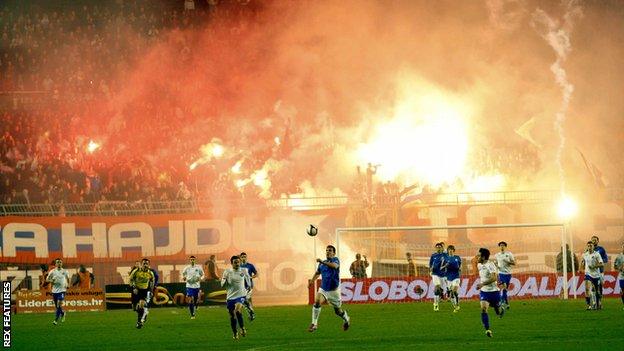
Hajduk Split host rivals Dinamo Zagreb in a Croatian league match in February 2013
As soon as the game begins, the Hajduk Split ultras start to bounce. Four thousand supporters pulsate as one thronging mass at one end of the ground.
On a desk 200 yards away, a glass of water shakes like the famous scene in Jurassic Park. Split's Stadion Poljud, constructed near a fault line, was built to be earthquake proof. Hajduk fans test that theory. The stadium is shaking.
By the hour mark in Wednesday's match against bitter rivals Dinamo Zagreb, a sea of red flares have been lit in the home end.
They are officially banned, but are smuggled into the stadium down trousers and in coat sleeves. The pitch and stands become engulfed in smoke, initially giving the scene a mystical quality - but eventually just blocking the view.
A number of flares make it over the running track and onto the pitch, forcing Dinamo goalkeeper Dominik Livakovic to move outside his penalty area for his own safety. Only then do the officials halt play for several minutes.
When Hajduk midfielder Mijo Caktas is sent off for a swinging arm that sparks a melee involving all 22 players, he is cheered from the pitch like a soldier returning home from war. In one section of the northern end, home supporters start a fire and seats are burnt. Fans continue to bounce, barely three metres from the blaze.
At no point does anyone act like this is out of the ordinary. Welcome to Croatia's Eternal derby.

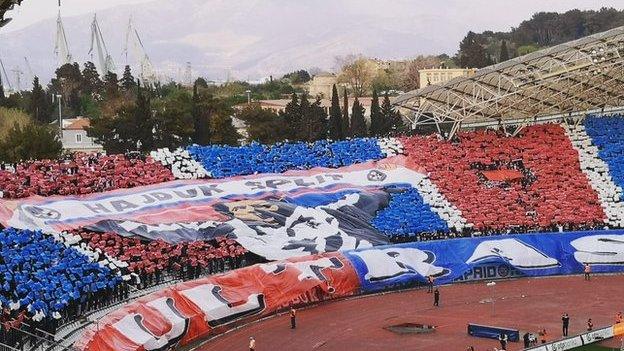
Hajduk's home ground, Stadion Poljud, is about 100m from the coast
The rivalry between Hajduk Split and Dinamo Zagreb can be traced back to the 1920s, but it has been supercharged since 1992. That was the first Croatian league season after the country declared independence from Yugoslavia in 1991.
Five years of war followed until diplomatic relations between the nations were restored in 1996.
Hajduk and Dinamo are Croatia's biggest clubs and were once part of the Yugoslav Big Four with Serb sides Red Star and Partizan Belgrade. Since independence, Hajduk and Dinamo have won 25 of 27 Croatian league titles and 21 of 27 domestic cups between them.
Several hours before Wednesday's game, home fans meet at Stari Plac, outside the headquarters of the Torcida supporters' club. A midweek fixture is not ideal, but beers are quickly downed to make up for lost time.
The Torcida are keen to make their feelings clear. If Split once felt subservient to former Yugoslav capital Belgrade, now they feel the same bitterness towards Zagreb.
Croatia is heavily centralised, with many people moving to the capital to study and work. Split, way down the Adriatic coast, feels ignored.
"We pay our taxes and Zagreb gets the benefits. So screw them," is a typical message.
For Split, Hajduk is a way of life. As the shipbuilding industry died out, the city was forced to rely on tourism as its principal source of post-war wealth. With locals forced out to make way for hotels and holiday apartments, tourism can erode an identity.
Hajduk is the antidote, a beacon and a religion, and the one social institution that is truly still theirs. This is a club owned by the people.
More than 25% of the shares lie with individual supporters who hand them down through the generations, with a plan to increase beyond a 50% majority. The Torcida is the oldest organised supporters' club in Europe.
Every tower block and spare wall is adorned with Hajduk's badge. Outside my apartment, the iconic image of a man wearing a bandana and sunglasses is daubed on the wall, paying homage to a Torcida leader from the 1980s who inspires today. Most of the ultras have a story of being beaten by rival fans. Some have scars that act as permanent reminders of their devotion.
"Hajduk is love," says former manager Damir Buric. "Before anything else, it's love. It's something that you are born with. Every person in this city has something deep inside of them. A Hajduk DNA. This isn't something that money can buy."
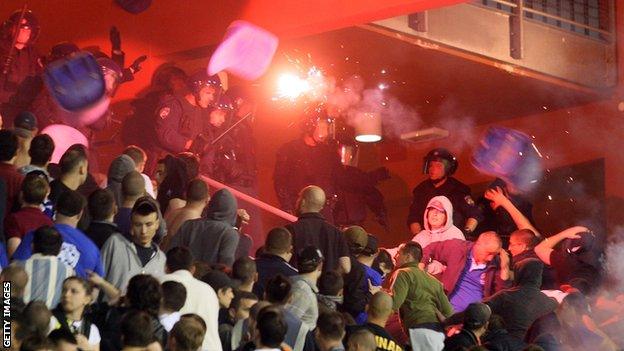
At a Zagreb home match in 2015, Dinamo ultras group the Bad Blue Boys threw flares and chairs at riot police
But money can buy success. Hajduk have gone 14 years without a league title and six years without a cup, while Dinamo have become dominant. They have won 12 of the past 13 titles. A 1-0 victory in Split on Wednesday sent them 17 points clear at the top of the table.
Walking out of the stadium takes you past the away dressing room, which has windows guarded with metal bars to stop stones from being thrown through. Dinamo's players chant songs of glory, having just danced in front of their supporters on the pitch. Hajduk fans whistled their disapproval at such taunting. Their side have now won just four of the past 37 Eternal derbies.
As the gap has grown, the bitterness and the lingering threat of violence have remained. In 2004, a car of Dinamo fans was ambushed and flares thrown inside to force them out into the open to be systematically beaten. After Hajduk suffered one defeat around the same time, a group of supporters broke into the Poljud and dug 11 graves into the pitch.
Niko Kranjcar, who moved from Dinamo to Hajduk in 2005, had a banner and candles placed outside his house telling him that he was dead., external
In 2010, violence inside Dinamo's Maksimir stadium spilled out onto the streets. In the running battles between supporters and with police, one officer lost his eye and a fan was shot in the stomach.
Ninety minutes before kick-off in the latest derby, 40 police vehicles and riot vans wait and countless private security guards patrol an area outside the away end. Extra vehicles meet the convoy of Dinamo supporters on the edge of the city and guide them to the ground. These measures are in place for only 500 away fans. Police offer both protection and heavy-handed intimidation.
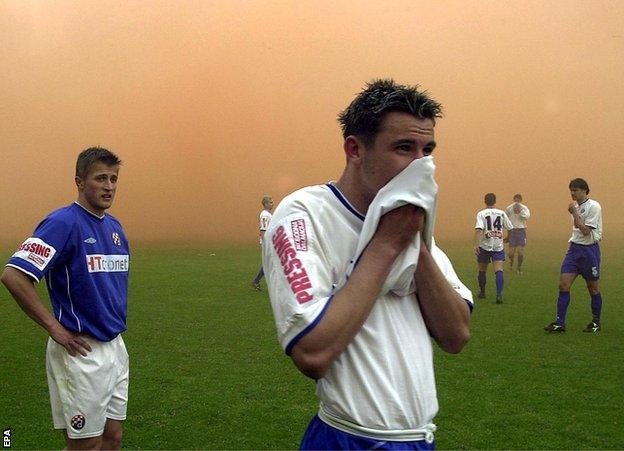
A 2002 match in Split was temporarily stopped due to thick smoke from smoke bombs
For all that divides these two hated rivals, there is plenty that unites them. They share one common goal - a hatred of the establishment they believe has left Croatian league football pitifully underfunded.
Davor Suker, president of the Croatian Football Federation, has gone from star striker to figure of fury. They accuse him of being a front for Zdravko Mamic, officially a football agent and administrator but the true power broker of Croatian football.
From 2003 to 2016, Mamic was the executive director of Dinamo. A club that is supposed to be a people's institution was run as his family fiefdom. Mamic signed "civilian contracts" with highly-rated players in their youth, forcing them to give him a percentage of his earnings.
Whatever success Mamic brought to the club, the Bad Blue Boys ultras of Dinamo will never forgive him. Mamic was sentenced to six-and-a-half years for transfer fraud in 2018 and subsequently fled to exile in Bosnia, but his ex-secretary is about to take over as president.
The two clubs also share a history of racism and anti-Semitism. Dinamo have just received a one-game stadium ban and fine for racist behaviour from supporters in a Europa League game against Benfica.
Two years ago, Hajduk received the same punishment for the same crime in the same competition. That element of Croatian fan culture cannot be ignored.
In 2013, Torcida and Bad Blue Boys came together in an act of defiance against alleged mismanagement by football authorities. They stood on the same terraces for two matches and marched through Zagreb together to protest. In the same year, an 18-year-old Torcida was beaten to death by police.
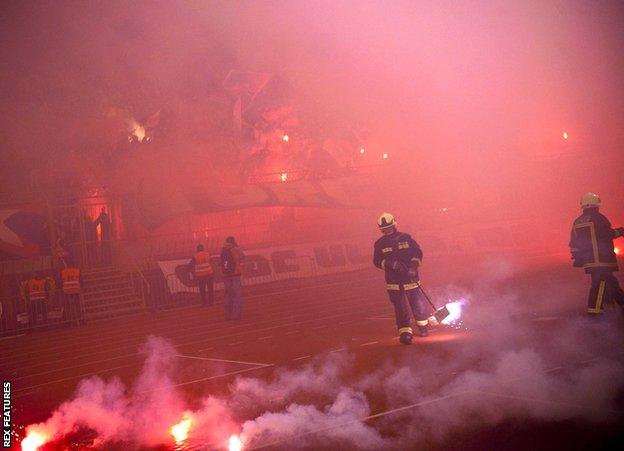
Firemen clear the pitch from flares thrown by Hajduk Split's Ultras Torcida fans during a home match with Zagreb in February 2013
But there were no friendships in Split on Wednesday. To some extent, this is a pantomime rivalry formed through necessity and the absence of any other outlet for their passion.
Despite Croatia's success on the world stage, there is little inherent football fan culture in the country. Attendances drop when teams are underperforming. Derbies are a chance to let loose, a day of civilian pride in a club and city.
For now, Hajduk are fighting the tide. They have great hopes in the latest crop of academy graduates (Ante Palaversa was signed by Manchester City in January), but the present is less appealing. They face a fight to finish in the top three and reach the Europa League qualifiers. Dinamo will be triumphant again.
But come rain or shine, win or defeat, the volume of the voices and the raw emotion in their disparaging chants towards the away end never changes. Attacking their own team in the derby, even in defeat, would be to let Dinamo win twice.
The only response to adversity is to chant twice as loud, bounce twice as hard and shake the stadium twice as much.
"If you don't become the new champion," the Torcida sing on nights like these, "Torcida will mourn, we'll forgive you. Because all of us still know that you're the best, and so we'll never turn our backs on you."
In a city whose identity could easily become fragile, only one thing is true: they never will.